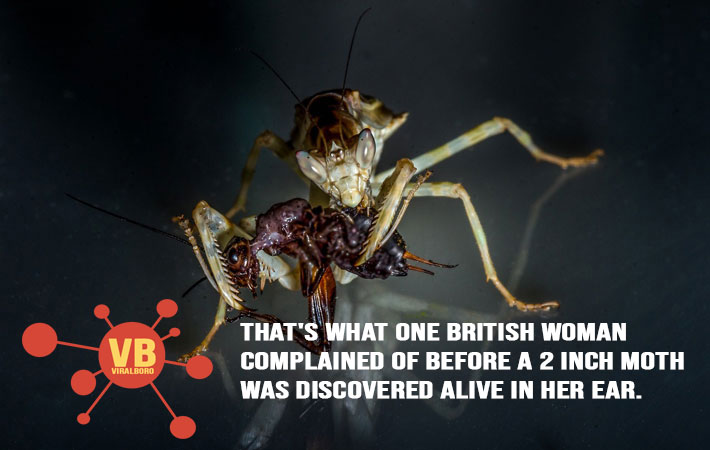The 5 Creatures Most Likely to Crawl in Your Ears
5. Got a pounding head?
That's what one British woman complained of before a 2 inch moth was discovered alive in her ear. According to http://www.dailymail.co.uk/health/article-190680/Tinnitus-No-moth-ear.html It began as a little buzzing sound that woke the 59 year old from her sleep and lasted four hours. It took two separate trips to the doctor before the discovery was made. As unlikely as it seems, there are other people who have documented moth extractions from their ears.
4. Good luck trying to get it out though
Ticks are notorious for seeking out warm places on your body to feed. For this reason, they often target soft hot spots like your groin or your scalp. So is it any wonder that they sometimes wander into your ear canal for a blood snack? While you might not notice their bite at first, it's likely you'll feel irritation as it engorges itself in your ear. Good luck trying to get it out though.
3. A Welsh woman suffered horrendous pain that she thought was a perforated eardrum
A Welsh woman suffered horrendous pain that she thought was a perforated eardrum, but which actually turned out to be a very large spider burrowed deep into her ear canal. It all began when she was changing in a beach hut and put on a hoody, in which the spider is suspected to have been occupying. According to http://www.telegraph.co.uk/news/2016/06/09/chunky-spider-pulled-alive-from-womans-ear-who-complained-of-hea/ she spent a sleepless night with a cotton ball in her ear, before the pain became unbearable. That was when her husband discovered something alive in her ear canal. She was rushed to the hospital, where the live spider was extracted with forceps.
2. The second most likely to crawl in your ear
The second most likely to crawl in your ear is the house fly. Drawn most likely to the smell of infection, the house fly is known to vomit on its food before ingesting. What could be worse than that? How about it laying babies in your ear? That's right, according to http://www.dailymail.co.uk/health/article-2365158/Horrified-woman-27-discovers-headaches-scratching-sounds-inside-head-FLESH-EATING-MAGGOTS.html#ixzz2ZDTjt0Nt a 27 year old British woman suffering headaches and hearing scratching noises in her head after a trip to Peru turned out to have flesh eating maggots burrowing 12mm deep into her ear canal. When doctors tried to extract the maggots, they retreated deeper into her head! A crazy insect called the New World Army Screw Worm Fly, which looks very much like a common house fly, had laid eggs in her ear. Although the woman recovered, if one had reached her brain it could have paralyzed or killed her in any number of horrible ways including brain bleeds and meningitis.
1. It all begins with their predisposition to being more active in the dark
The cockroach is known to make itself at home in human habitats, but did you know that this gregarious insect is also more likely to get friendly with the human ear? It all begins with their predisposition to being more active in the dark of night when you are asleep. Why do they go in your ear? Cockroaches exhibit positive thigmotaxis, or the preference to squeeze into small spaces. Your ear canal is warm and inviting to any cockroach that happens to be crossing your pillow. So next time you have an ear infection, ask yourself "Do I have cockroaches?"

